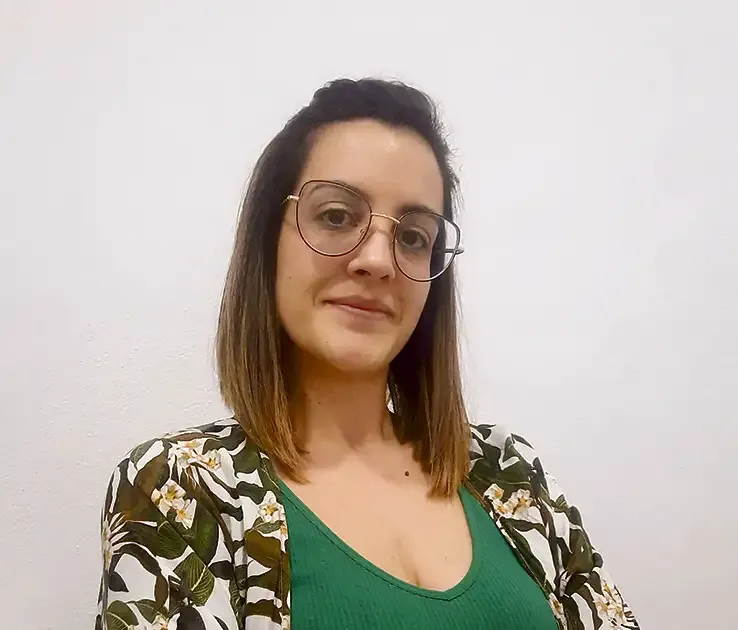
Rocío Bueno Martínez, Nutrition Coordinator of the HLA Group
“It is more important to focus in the quality of the food than in the quantity”
There is a direct relationship between food and health. And to get to know her and be able to enjoy her, Rocío Bueno Martínez, an expert in nutrition, recalls the fundamental role of professionals like her and of nutritional education. Beyond banishing false beliefs, it reinforces that its role is to help create good relationships with food, all for the sake of the patient’s health, and not for an ideal of beauty.
In today’s society, two extremes can be seen: a population that pursues the image and the cult of the body and, on the other hand, an increase in obesity.
I think they are a clear example of the need to inform the population about food education from reliable sources of information. It is important to teach how to eat, but it is also important to influence a good relationship with food. The focus should be on following a correct diet to achieve health and not on pursuing an ideal image, pants size or number on the scale.
What should a healthy and balanced diet look like?
A diet should consist mostly of unlabeled fresh produce. To translate this, there is a simple tool that is the Harvard plate. In it we can observe —in a very visual way— that the proportions of food groups are 50% fruits and/or vegetables, 25% carbohydrates (preferably from sources such as tubers, legumes or cereals in the integral version) and 25% protein contemplating lean meats, white and blue fish (also shellfish), eggs and those of vegetable origin, such as legumes, nuts or seeds. The diet should also include olive oil, avocado or seeds, as sources of fat necessary for many processes in the body.
To this healthy diet, you must always add water as the main drink and lead an active life. Finally, it is important to take care of mental health and get a good rest to find the ideal of a healthy life.
What health benefits does the Mediterranean diet provide?
This diet has numerous properties if we follow the pattern of the true Mediterranean diet: olive oil, nuts, fruits and vegetables, quality proteins and adequate carbohydrates. This healthy and balanced diet should never be associated with the pyramid based on refined cereals, among other foods, which do not fit in at all with good healthy habits.
What kinds of ‘miracle diets’ are in fashion today?
Unfortunately, in matters of food, unprofessional advice is followed more than the one given by the specialists on this subject, the dietitians and nutritionists. We can find lots of different formulas, from miraculous diets focused on a concrete food or food group, such as protein, to diets with long periods of fasting without any type of control. These diets have some common elements: they generally promote caloric restriction, the need to feel hungry, and they are impossible to maintain over time.
From my point of view, true atrocities focused on body image rather than health are done. They are diets that, in addition, at the level of mental health only reinforce a bad relationship with food, favoring the appearance of eating disorders (TCA) and feelings of frustration, which can end up causing a bad relationship with food.
Of course, all of them favor the appearance of nutritional deficiencies and predispose to a safe rebound effect; among other reasons, due to caloric restriction and the impact that this generates on the body.
How can you dismantle myths as deep-rooted as the one that says that bread or fruit at night make you fat?
Applying nutritional education and giving way to nutritionists and specialists updated and trained in this matter. The inclusion of this profession in a public and private health system is necessary to apply prevention and health promotion through a correct diet with fundamentals as basic as the purchase of fresh products and the simple combination of nutrient groups.
But the problem can also be the large amount of information and the fake news. There are those who say that you have to eat five meals a day, another who recommends three, even fasting. How can people know what is best for them?
The most appropriate thing is to go to a nutritionist’s office so that they can adapt the diet to each specific case and not treat in a generic way, for example, the number of meals in the population. In my professional experience, it is more important to focus on the quality of the meals than the quantity. The focus should be on knowing what to eat and adapting it to the needs of each person. With so many recommendations (always biased by interests, especially from the industry) we have forgotten to listen to the body and the feeling of hunger goes unnoticed. This is vital to get it back!
How should the treatment between nutritionist and patient be? What should this health specialist rely on when creating individual nutritional plans?
The treatment should be close and, above all, empathetic and professional. Nutrition is a science, and like all health sciences, it is alive. Concepts and recommendations are updated on a recurring basis, and this is essential to apply in the consultation. Of course, the intervention of the nutritionist in a multidisciplinary team that allows the patient to have a vision of their health from all the professional points of view necessary for their well-being is absolutely necessary.
And it’s crucial to always personalize nutritional plans. The nutritionist must have a global vision and delve into the patient’s habits for good adherence to treatment.
What relationship is there between what we eat and the possible diseases that we have during life?
There is a lot of relationship. Diet must prevent diseases that are currently and, unfortunately, on the rise, such as diabetes (with an increasingly early onset), high blood pressure and other cardiovascular diseases. In these cases, obesity and being overweight act as one of the risk factors, and they also do so for different types of cancer. Today there are many young people with pathologies of this style that could be improved, and even reversed, with corrections in their diet and lifestyle.



